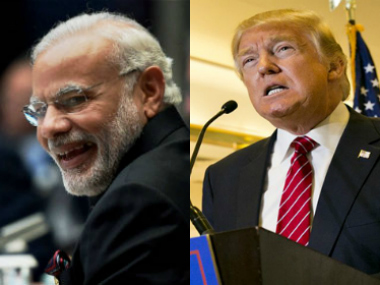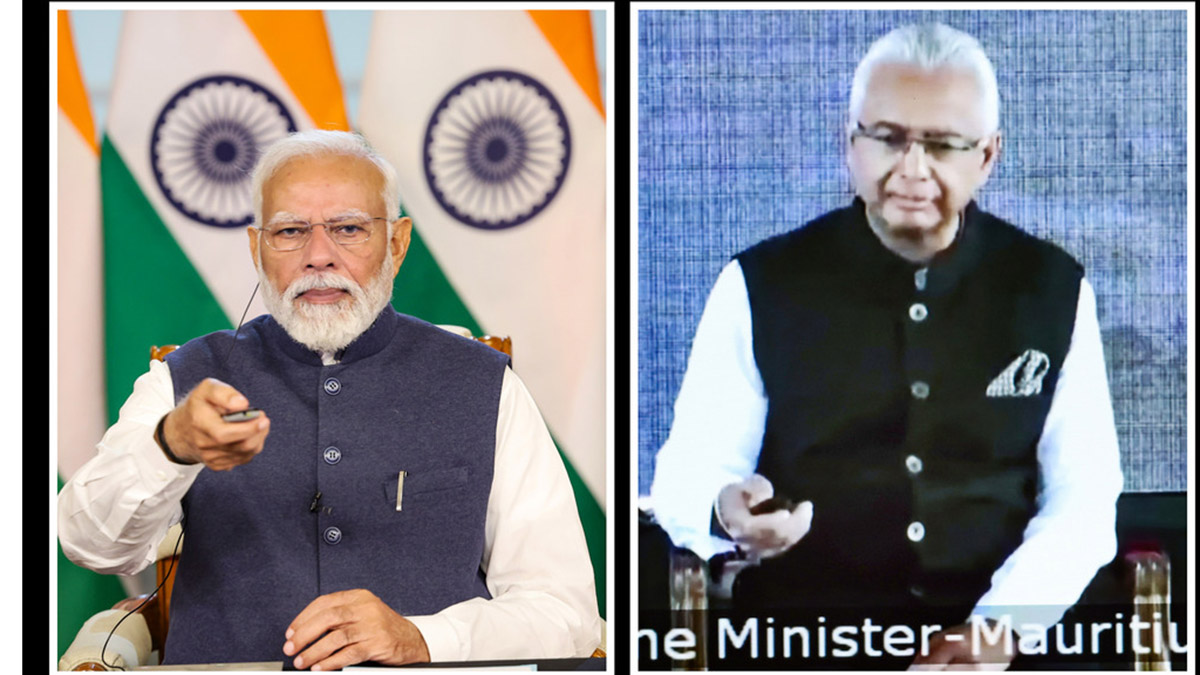President Donald Trump welcomed Prime Minister Narendra Modi to the White House Tuesday for their first meeting, as the US branded a top militant from neighboring Pakistan as a “global terrorist.”
The leaders of the world’s two largest democracies are looking to expand ties on defense and fighting terrorism, but strains are likely on trade. Their personal chemistry could prove as important as policy in setting the tone for relations.
During brief Oval Office remarks, Trump heaped praise on Modi as a “great prime minister” who had brought economic growth to India. Modi recalled Trump’s visits to India long before he was president and said he was looking forward to collaborating with him now that he is president.
“The relationship between the United States and India is very, very strong and very, very powerful,” Trump said. “We agree on most things. And I would say, by the end of the day we’ll agree on everything. I have a feeling,” he joked.
Hours before Modi’s arrival, the state department imposed sanctions on Syed Salahuddin, the Pakistan-based leader of Hizbul Mujahideen, the main rebel group that fights against Indian control in the divided Himalayan region of Kashmir. India’s foreign ministry hailed the move.
Trump has so far focused on outreach to China, India’s other strategic rival, as he looks to Beijing to rein in nuclear-armed North Korea. But Washington and New Delhi share concerns about China’s rise as a military power that has underpinned increasingly close relations in the past decade.
The Trump administration says it wants to provide India the kind of defense technology it does to the closest US allies. In a concrete indication of that, the state department approved the $365 million sale of a C-17 military transport aircraft. The administration is also set to offer a $2 billion sale of US-made unarmed drones to help in surveillance of the Indian Ocean.
Trump thanked Modi for India’s purchase of US military equipment. Since 2008, India has signed more than $15 billion in US defense contracts.
Although Modi’s two-day Washington visit, which began Sunday, is lower key than his previous three trips to the US since he took office in 2014, there will be plenty opportunity for face time with Trump.
After their talks, Modi and Trump made statements in the Rose Garden. Modi will also have dinner with the president and first lady: The first dinner Trump has hosted for a foreign dignitary at the White House, although he has hosted the leaders of Japan and China at his resort in Florida.
Before going to the White House, Modi met separately with Secretary of State Rex Tillerson and defense secretary Jim Mattis.
Trump and Modi share a populist streak and a knack for social media, but their economic nationalist agendas could clash. While Trump champions the idea of “America First” and wants to stop the migration of jobs overseas, Modi has his own drive to boost manufacturing at home, dubbed “Make in India.”
India is among the nations singled out by the Trump administration for their trade surpluses with the US, and it is also reviewing a visa program used heavily by skilled Indian workers.
Both sides want better market access. US is seeking stronger Indian protection of intellectual property rights, reductions in tariffs and narrowing of the $30 billion trade deficit. India has its own concerns, including over regulatory barriers faced by its producers of generic medicinal drugs.
Michael Kugelman, a South Asia expert at the Wilson Center, predicted that Wednesday’s summit would be a “no-frills, let’s get acquainted affair” whose outcomes, from their body language to the post-meeting joint statement, will offer clues about the future of US-India relations.
“For Trump, the personal is political,” said Atman Trivedi, an Asia specialist at Hills & Company consultancy.
Ashok Sajjanhar, a former Indian diplomat, said that India is hopeful but apprehensive. “Modi’s effort during the visit would be to get Trump strategically engaged with India: To get him to see the India-US partnership as a win-win for both countries,” Sajjanhar said.
On fighting terrorism, Kugelman said the two leaders have a similar worldview: That “it needs to be destroyed wherever it rears its murderous head.”
He said the designation of Salahuddin shows that Washington is willing to work closely with New Delhi on terrorism-related matters although it remains to be seen if that signals a tougher policy toward Pakistan. India accuses Pakistan-based militants of launching attacks on its soil.
Modi will also want to learn about the administration strategy to stabilise Afghanistan, where India has committed $3 billion in aid since 2001.
Climate change could be a contentious issue. New Delhi was irked by Trump’s decision to pull out of the Paris Agreement.


)




)
)
)
)
)
)
)
)